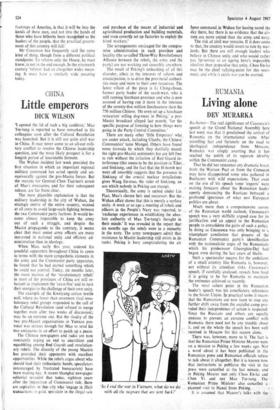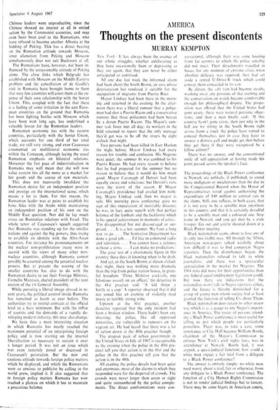Living alone
RUMANIA DEV MURARKA
Bucharest—The real significance of Ceausescu's speech at the Grand National Assembly here last week was that it proclaimed the arrival of Rumania on the international scene. After travelling fast and furiously on the road to ideological independence from Moscow, Rumania was simply asserting that it has reached the zenith of its separate identity within the Communist camp.
That he did not announce any dramatic break from the Warsaw Pact or from the Comecon may have disappointed some who gathered in Bucharest with wild expectations. That ,even on the eve of his speech some 'experts' were making forecasts about the Rumanian leader openly denouncing the Russians betrayed a profound ignorance of what east European politics are about.
Much more than a comprehensive survey of the Rumanian world outlook, Ceausescu's speech was a very skilfully argued case for its justification and an appeal to the Rumanian people to consolidate the gains of such a policy. In doing so Ceausescu was only bringing to a triumphant conclusion that process of the Rumanian Communist party's identification with the nationalistic urges of the Rumanians which his predecessor Gheorghiu-Dej had begun even during the last years of Stalin.
Such a spectacular success for the ambitions of a small country like Rumania is, however. not without its attendant risks. Ceausescu's speech, if carefully analysed, reveals how hard it is going to be for Rumania to maintain the eminence achieved so recently.
The most salient point in the Rumanian leader's speech was his conciliatory references to the Soviet Union. In practical terms it means that the Rumanians are now keen to stop any further drift away from the socialist camp pro- vided their independence of action is respected. Since the Russians and others are equally anxious to prevent an extreme conflict with Rumania there need not be any trouble about it, and on the whole the speech has been well received in Moscow for this reason alone.
There was, however, more to it. The fact is that the Rumanian Prime Minister Maurer went on a mission to Peking a few weeks ago. Not a word about it has been published in the Rumanian press and Rumanian officials refuse to talk about it altogether. But it is known now that instructions to publicise the visit in the press were cancelled at the last minute. and in Peking Maurer met only Chou En-lai and Chen Yi and not Mao Tse-tung. The Rumanian Prime Minister also cancelled planned visit to Hanoi from Peking.
It is assumed that Maurer's talks with the Chinese leaders were unproductive, since the Chinese showed no interest at all in united action by the Communist countries, and may even have been cool to the Rumanians, who have refused to become another Albania at the bidding of Peking. This has a direct bearing on the Rumanian attitude towards Moscow, since alienation from Peking and Moscow simultaneously does not suit Bucharest at all.
The Rumanians have, however, not been in- fluenced by the unreasonable attitude of Peking alone. The close links which Belgrade has established with Moscow on the Middle Eastern problem and the cancellation of de Gaulle's visit to Rumania have brought home to them that very few countries will court them at the ex- pense of their own relationship with the Soviet Union. This, coupled with the fact that there is a feeling of some irritation in the east Euro- pean countries on the ground that Rumania has been fighting battles with Moscow which have been won long ago, has underlined a valuable lesson for the Rumanian leaders.
Rumanian economic ties with the eastern countries, particularly with the Soviet Union, which accounts for one third of her total trade, are still very strong, and even Ceausescu commented on multilateral economic ties within the Comecon, although laying the usual Rumanian emphasis on bilateral relations. Moreover the fast pace of industrialisation in Rumania may well mean that she will now value eastern ties all the more as a market for her goods and the source of raw materials.
This does not necessarily invalidate the Rumanian desire for an independent position and prestige on the international scene, which means a lot to them. For this reason, the Rumanian leader was at pains to establish his bona fides with the Arabs while maintaining an independent position of his own on the Middle East question. Nor did he lay much stress on Rumanian relations with Israel. The whole tenor of Ceausescu's speech suggested that Rumania was standing up for the smaller nations and against the big powers, thus trying to establish an identity with the Afro-Asian countries. For instance his pronouncements on the nuclear non-proliferation treaty were in accord with the views of many other non- nuclear countries, although Rumania cannot possibly be counted among the potential nuclear powers. But at present the wooing of the smaller countries has also to do with the Rumanian desire to see their Foreign Minister, Corneliu Manescu, elected president of the next session of the UN General Assembly.
While pursuing a liberal image abroad in re- cent years, the political control inside Rumania has remained as harsh as ever before. The authorities try to restrict contacts at the official level to a bare minimum. But with the influx of tourists and ,the demands of a rapidly de- veloping modern industry, this may also change.
We have thus a most interesting situation in which Rumania has nearly reached the maximum potential of an enterprising foreign policy and is now starting on the internal liberalisation so necessary to sustain it over a longer period. It was not an issue which was even remotely posed or discussed in Ceausescu's peroration. But the new and cautious attitude towards foreign policy matters which he displayed, and which the Rumanians were so anxious to publicise by calling in the world press, implied it. It also suggested that in foreign policy matters Rumania has now reached a plateau on which it has to maintain a precarious balance.































 Previous page
Previous page